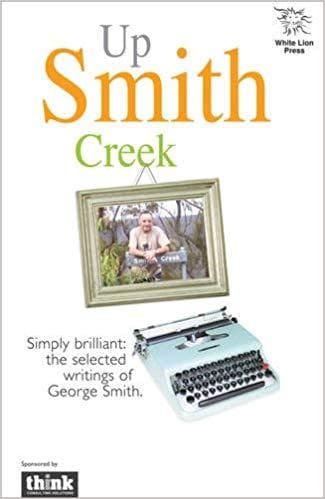George Smith: the art of creative fundraising — ‘Give us your money – or the panda gets it!’
We return to the wit and wisdom of the late, great George Smith with an excerpt from his superb collection of writings Up Smith Creek.
- Written by
- George Smith
- Added
- September 19, 2019


‘Give us your money – or the panda gets it!’
It may seem something of an oxymoron to describe George Smith as brilliant and simple. But any fundraiser worth his or her salt will recognise this as a high double compliment. For simplicity and brilliance both are qualities essential to successful fundraising, yet they remain rare and elusive, seldom found together. Smith has them both, in buckets.
George Smith has also been described as ‘the George Orwell of fundraising’ and as, ‘a good man fuelled by the quiet zeal to make the world a better place’. Both are unquestionably true, but then it’s also true that, when interviewing applicants for almost any job worth having in his agency Smith Bundy and Partners, George would startle interviewees by asking, ‘Do you bowl leg spin?’ as his opening question. He also wrote the headline above, admittedly as a spoof, for his long-time client WWF.
If you are inspired by passion and clear thinking, if you yearn for innovation, cleverness and insight, then you’ll find much to treasure among George Smith’s musings down the years on the art, science and absurdity of making a living by parting donors, willingly, from their money.
The above paragraphs come from a promotion of George Smith’s collected essays and articles, Up Smith Creek, published in 2011. As a gift to SOFII readers we’re posting a few more selected extracts from this tome here, to add to SOFII’s growing collection. Here’s the latest addition:

I know they do a good job, but...
by George Smith,
October 1992.
The days of a royal name on the letterhead of every charity may be numbered, says George Smith. Was he prophetic, or might his vision yet come to pass?
Let’s be bloody tactless this month. Let’s talk about the House of Windsor.
Strangely, I have always been fairly relaxed about the monarchy. My oId mum was a stalwart supporter and what was good for my old mum was always good enough for me. There always seemed to me better things to worry about and on the few occasions when professional duties had me in a line shaking a royal hand, I had to confess to a certain je ne sais quoi and a desire to keep the photographs.
So these are not the observations of a rabid republican. I tend to turn into one late at night when we’re on the umpteenth bottle and when talk turns to the British class structure, which I still take to be the source of most of our social ills. My regime would be Cromwellian and would therefore dispense of the monarchical apex to our society, but I have no desire to dispose of the current incumbents by way of lampposts or scaffolds.
But there is a symbiotic relationship between the Royal Family and British fundraisers and there always has been. There is a lot of cheap fun to be had in reporting the antics of charity managers and trustees who have fawned and grimaced and swooned in the presence of a royal personage. I have witnessed occasions when voluntary organisations have spent more time in planning the triennial forty-five minute visit of the royal patron than they have in organising their entire year’s publicity programme. I have seen grown men become apoplectic: when the desks in the accounts department were seen as less than shipshape before the princess passed through on her beaming way.
It is all slightly silly, but I know that the same applies when the visit is by the Lord Lieutenant’s viceroy or the Under Secretary for Important Things or when a third-rate television personality has accepted an invitation to attend a reception. We are a deferential lot and we like our little ceremonies. It looks good in the newsletter.
Only a naive or a nasty commentator would pretend otherwise.
The securing of royal support and patronage has always been seen as a priority for British charities and the press has recentIy been doing its homework and counting the myriad organisations with a royal on the letterhead. There can be no doubt that such patronage has been of value in fundraising, none whatsoever. The attachment of a royal has always conferred status and the presence of a royal has always extracted cheques from the audience. Only a naive or a nasty commentator would pretend otherwise.
But now? In my judgement, the recent travails of the royal family are going to mean a total reassessment of their social worth. A monarchy needs mystique to thrive and 1992 has seen a total shattering of that mystique. It is now known that they behave precisely as their subjects behave. No one who reads history should exactly be astonished by this revelation, but those appalling little creeps who sit in trees with telephoto lenses and who tap into telephone calls will have proved to be social engineers way beyond their grubby remits.
Exit mystique then. Exit personal dignity and deference and admiration, It may all be grossly unfair and vulgar but it is happening. And it must force charities, at least the worldly ones, to reappraise their royal relationships. Speaking with numbing crudity, I suggest that royals will have less fundraising value in future. I think it already true that certain members of that besieged extended family have zilch value as fundraising totems. I expect to hear of the odd social event which is cancelled because the royal. drawing power is not what it was.
There is also a political dimension to this. I think that the government is going to have to make the odd constitutional rearrangement. The civil list may be curbed, the Queen’s tax immunity adjusted, the whole monarchical act called into question. Mr Major (then UK prime minister) is unlikely to be a Marat but he is shrewd enough to be a Talleyrand. He may have no choice, for a country having such a bad time of it may well begin to include some parts of the royal family in its list of scapegoats. In other words, the way in which we pay for our monarchy may become a hot political potato for the first time in a hundred and fifty years.
Fundraisers should pause in their traditional acts of obeisance. The institution is not going to be abolished but it is going through a profound sea change. it is no longer going to be a passport to social approval and visibility. Yet I have this uneasy feeling that charities will try and cling to the apparent status quo way beyond its sell-by date. I fancy that the last wide-eyed courtiers will be fundraisers, beguiling themselves that things are as they were. If they do, they will not feature in revolutionary tumbrils: they will simply be more and more ignored by the public at large. It. will be a quiet and passive British tragedy. For charities will be marginalised.
I freely expect a postbag telling me that I am a cad. It is not inconceivable that I shall be challenged to a duel. In which case I nominate the darts board at Noordwijkerhout as my ground and the Congrescentrum’s darts as my weapons. Double for start?
At the time of writing George Smith was chairman of ad agency Smith Bundy and Partners and chief executive of the International Fundraising Workshop, later renamed The Resource Alliance. They ran then and still run what’s arguably the best fundraising conference in the world, the International Fundraising Congress, each October at Noordwijkerhout’s Congresscentrum in Holland.

















